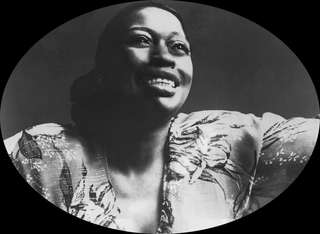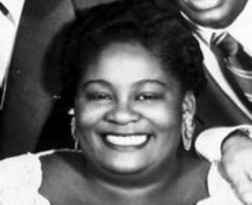Rhythm and blues, often abbreviated as R&B, is a genre of popular music that originated in African-American communities in the 1940s. The term was originally used by record companies to describe recordings marketed predominantly to urban African Americans, at a time when "urbane, rocking, jazz based music with a heavy, insistent beat" was becoming more popular. In the commercial rhythm and blues music typical of the 1950s through the 1970s, the bands usually consisted of piano, one or two guitars, bass, drums, one or more saxophones, and sometimes background vocalists. R&B lyrical themes often encapsulate the African-American experience of pain and the quest for freedom and joy, as well as triumphs and failures in terms of relationships, economics, and aspirations.

Muddy Waters (1913–1983) was an American blues artist widely considered to be one of the most important figures in post–World War II Chicago blues. He popularized several early Delta blues songs, such as "Rollin' and Tumblin'", Walkin' Blues", and "Baby, Please Don't Go", and recorded songs that went on to become blues standards, including "Hoochie Coochie Man", "Mannish Boy", and "Got My Mojo Working". During his recording career from 1941 to 1981, he recorded primarily for two record companies, Aristocrat/Chess and Blue Sky; they issued 62 singles and 13 studio albums.

Johnny Otis was an American singer, musician, composer, arranger, bandleader, talent scout, disc jockey, record producer, television show host, artist, author, journalist, minister, and impresario. He was a seminal influence on American R&B and rock and roll. He discovered numerous artists early in their careers who went on to become highly successful in their own right, including Little Esther Phillips, Etta James, Big Mama Thornton, Johnny Ace, Jackie Wilson, Little Willie John, Hank Ballard, and The Robins, among many others. Otis has been called the "Godfather of Rhythm and Blues".

Johnny Shuggie Otis is an American singer-songwriter, recording artist, and multi-instrumentalist.

Esther Phillips was an American singer, best known for her R&B vocals. She also performed pop, country, jazz, blues and soul music.

Marion Walter Jacobs, known as Little Walter, was an American blues musician, singer, and songwriter, whose revolutionary approach to the harmonica had a strong impact on succeeding generations, earning him comparisons to such seminal artists as Django Reinhardt, Charlie Parker and Jimi Hendrix. His virtuosity and musical innovations fundamentally altered many listeners' expectations of what was possible on blues harmonica. He was inducted into The Rock and Roll Hall of Fame in 2008, the first and, to date, only artist to be inducted specifically as a harmonica player.

"Hound Dog" is a twelve-bar blues song written by Jerry Leiber and Mike Stoller. Recorded originally by Big Mama Thornton on August 13, 1952, in Los Angeles and released by Peacock Records in late February 1953, "Hound Dog" was Thornton's only hit record, selling over 500,000 copies, spending 14 weeks in the R&B charts, including seven weeks at number one. Thornton's recording of "Hound Dog" is listed as one of the Rock and Roll Hall of Fame's "500 Songs That Shaped Rock and Roll", and was inducted into the Grammy Hall of Fame in February 2013.
Southern soul is a type of soul music that emerged from the Southern United States. The music originated from a combination of styles, including blues, country, early rock and roll, and a strong gospel influence that emanated from the sounds of Southern black churches. Bass guitar, drums, horn section, and gospel roots vocal are important to soul groove. This rhythmic force made it a strong influence in the rise of funk music. The terms "Deep soul", "Country soul", "Downhome soul" and "Hard soul" have been used synonymously with "Southern soul"p. 18
"Pledging My Love" is a blues ballad. It was written by Ferdinand Washington and Don Robey and published in 1954.
Little Johnny Taylor was an American blues and soul singer. He made recordings throughout the 1960s and 1970s, and continued public performances through the 1980s and 1990s.
Melvin Lightsy, known professionally as Mel Walker, was an American R&B singer best known for his recordings in the early 1950s as lead male singer with the Johnny Otis Orchestra.
"It's Just a Matter of Time" is a popular song written by Brook Benton, Clyde Otis, and Belford Hendricks. The original recording by Benton topped the Billboard rhythm & blues chart in 1959 and peaked at No. 3 on the Hot 100 pop chart, the first in a string of hits for Benton that ran through 1970.

Otis Lee Clay was an American R&B and soul singer, who started in gospel music. In 2013, Clay was inducted to the Blues Hall of Fame.

"Driftin' Blues" or "Drifting Blues" is a blues standard, recorded by Johnny Moore's Three Blazers in 1945. The song is a slow blues and features Charles Brown's smooth, soulful vocals and piano. It was one of the biggest blues hits of the 1940s and "helped define the burgeoning postwar West Coast blues style". "Driftin' Blues" has been interpreted and recorded by numerous artists in various styles. The Blues Foundation Hall of Fame and the Rock and Roll Hall of Fame have acknowledged the influence and lasting popularity of the song.
"Double Crossing Blues' is a 1950 song by the Johnny Otis Quintette, the Robins, and Little Esther. It was released as a 78-rpm single (731-A) by Savoy Records in 1950. The single went to number one on the Billboard R&B chart.

Henry Bernard Glover was an American songwriter, arranger, record producer and trumpet player. In the music industry of the time, Glover was one of the most successful and influential black executives. He gained eminence in the late 1940s, primarily working for the independent King label. His duties included operating as a producer, arranger, songwriter, engineer, trumpet player, talent scout, A&R man, studio constructor, while later in his career he became an owner of his own label. Glover worked with country, blues, R&B, pop, rock, and jazz musicians, and he helped King Records to become one of the largest independent labels of its time.

Marie Adams was an American gospel and R&B singer, who became popular in the 1950s particularly for her work with Johnny Otis.
"Cupid's Boogie" is a 1950 song by Little Esther backed by bandleader, and writer of the song, Johnny Otis for Savoy Records which went to #1 on the US R&B Chart.










